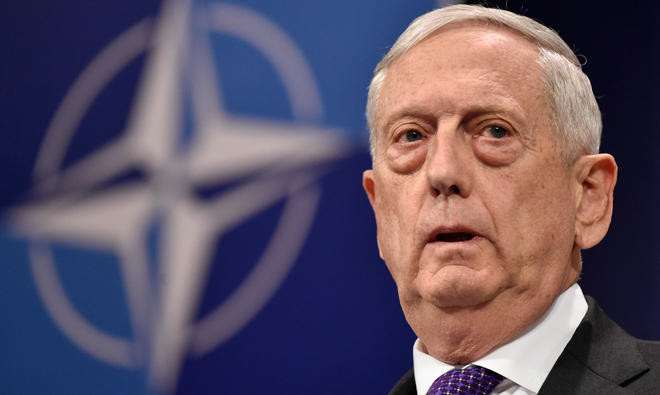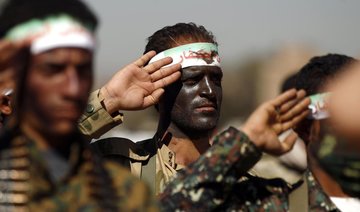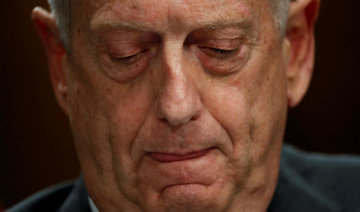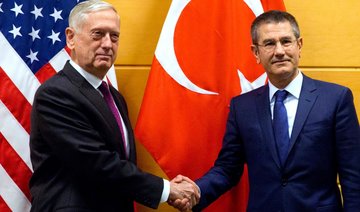WASHINGTON: US Defense Secretary Jim Mattis defended US military support to Saudi Arabian-led coalition forces in Yemen on Thursday as he explained a personal appeal to lawmakers who are considering whether to end Washington’s involvement in the devastating conflict.
The Trump administration has been warning Saudi Arabia since last year that concern in Congress over the humanitarian situation in Yemen, including civil casualties in the war, could constrain US assistance.
Since it began in 2015, the conflict has killed more than 10,000 people, displaced more than 2 million and driven Yemen – already the poorest country on the Arabian Peninsula – to the verge of widespread famine.
Mattis said the US assistance, which includes limited intelligence support and refueling of coalition jets, was ultimately aimed at bringing the war toward a negotiated, UN-brokered resolution.
“We need to get this to a negotiated settlement, and we believe our policy right now is correct for doing this,” Mattis told reporters, as he flew back to Washington from the Middle East.
A bipartisan group of senators, Republican Mike Lee, independent Bernie Sanders and Democrat Chris Murphy, are attempting to take advantage of a provision in the 1973 war powers act that allows any senator to introduce a resolution on whether to withdraw US armed forces from a conflict not authorized by Congress.
Their resolution would force Trump “to remove United States Armed Forces from hostilities in or affecting the Republic of Yemen,” except operations against Al-Qaeda or associated forces. Those are authorized under a 2001 congressional authorization.
Their action is the latest salvo in an ongoing battle between the US Congress and the White House over control of military conflicts.
In a March 14 letter to Senate majority leader Mitch McConnell, and copied to other lawmakers, Mattis described the US assistance as “non-combat support” focused on helping reduce the risk of civilian casualties.
“New restrictions on this limited US military support could increase civilian casualties, jeopardize cooperation with our partners on counter-terrorism and reduce our influence with the Saudis — all of which would further exacerbate the situation and humanitarian crisis,” Mattis wrote.
Mattis also warned that a withdrawal would embolden the Iran-aligned Houthi rebels, who have fired missiles at Saudi Arabia and targeted commercial and military vessels off Yemen’s coast.
Lawmakers have argued for years that Congress has ceded too much authority over the military to the White House. Under the Constitution, Congress – not the president – has the authority to declare war.
But divisions over how much control they should exert over the president have stymied efforts to pass new war authorizations.
Mattis: Don’t restrict US support to Saudi-led forces in Yemen
Mattis: Don’t restrict US support to Saudi-led forces in Yemen

Israel to ease domestic restrictions imposed due to Iran war: minister
JERUSALEM: Israel will ease domestic restrictions imposed on its population due to the ongoing war with Iran and will “reopen its economy,” Defense Minister Israel Katz said on Wednesday.
“While we continue our intense fight against Iran until the threats are removed, we will also reopen the economy, ease restrictions, and restore Israel to paths of creativity, activity, and security,” Katz was quoted as saying in a statement after approving the changes for most of the country starting Wednesday evening.
At least 51 Palestinians killed while waiting for aid trucks in Gaza, health officials say

- OCHA said the people killed were waiting for food rations arriving in UN convoys
- Yousef Nofal, an eyewitness, said he saw many people motionless and bleeding on the ground after Israeli forces opened fire
KHAN YOUNIS, Gaza Strip: At least 51 Palestinians were killed and more than 200 wounded in the Gaza Strip while waiting for UN and commercial trucks to enter the territory with desperately needed food, according to Gaza’s Health Ministry and a local hospital.
Palestinian witnesses told The Associated Press that Israeli forces carried out an airstrike on a nearby home before opening fire toward the crowd in the southern city of Khan Younis.
The Israeli military said soldiers had spotted a gathering near an aid truck that was stuck in Khan Younis, near where Israeli forces were operating. It acknowledged “several casualties” as Israelis opened fire on the approaching crowd and said authorities would investigate what happened.
The shooting did not appear to be related to a new Israeli- and US-supported aid delivery network that rolled out last month and has been marred by controversy and violence.
The UN Office for the Coordination of Humanitarian affairs, or OCHA, said the people killed were waiting for food rations arriving in UN convoys.
Also on Tuesday, the main Palestinian telecoms regulatory agency based in the West Bank city of Ramallah reported that Israeli strikes had cut off fixed-line phone service and Internet access in central and southern Gaza.
‘Aren’t we human beings?’
Yousef Nofal, an eyewitness, said he saw many people motionless and bleeding on the ground after Israeli forces opened fire. “It was a massacre,” he said, adding that the soldiers continued firing on people as they fled from the area.
Mohammed Abu Qeshfa reported hearing a loud explosion followed by heavy gunfire and tank shelling. “I survived by a miracle,” he said.
The dead and wounded were taken to the city’s Nasser Hospital, which confirmed 51 people had been killed. Later Tuesday, medical charity MSF raised the death toll to 59, saying that another 200 had been wounded while trying to receive flour rations in Khan Younis.
Samaher Meqdad was at the hospital looking for her two brothers and a nephew who had been in the crowd.
“We don’t want flour. We don’t want food. We don’t want anything,” she said. “Why did they fire at the young people? Why? Aren’t we human beings?”
Palestinians say Israeli forces have repeatedly opened fire on crowds trying to reach food distribution points run by a separate US and Israeli-backed aid group since the centers opened last month. Local health officials say scores have been killed and hundreds wounded.
In those instances, the Israeli military has acknowledged firing warning shots at people it said had approached its forces in a suspicious manner.
Deadly Israeli airstrikes continued elsewhere in the enclave on Tuesday. Al-Awda Hospital, a major medical center in northern Gaza, reported that it has received the bodies of eight Palestinians killed in an Israeli strike on a house in the central Bureij refugee camp.
Desperation grows as rival aid systems can’t meet needs
Israel says the new system operated by a private contractor, the Gaza Humanitarian Foundation, is designed to prevent Hamas from siphoning off aid to fund its militant activities.
UN agencies and major aid groups deny there is any major diversion of aid and have rejected the new system, saying it can’t meet the mounting needs in Gaza and that it violates humanitarian principles by allowing Israel to control who has access to aid.
Experts have warned of famine in the territory that is home to some 2 million Palestinians.
The UN-run network has delivered aid across Gaza throughout the 20-month Israel-Hamas war, but has faced major obstacles since Israel loosened a total blockade it had imposed from early March until mid-May.
UN officials say Israeli military restrictions, a breakdown of law and order, and widespread looting make it difficult to deliver the aid that Israel has allowed in.
Olga Cherevko, a spokesperson for OCHA, said on Tuesday that the aid Israeli authorities have allowed into Gaza since late May has been “woefully insufficient.”
Fuel has not entered Gaza for over 100 days, she said. “The only way to address it is by sufficient volumes and over sustained periods of time. A trickle of aid here, a trickle of aid there is not going to make a difference.”
Israel’s military campaign since October 2023 has killed over 55,300 Palestinians, more than half of them women and children, according to Gaza’s Health Ministry. Its count doesn’t distinguish between civilians and combatants.
Israel launched its campaign aiming to destroy Hamas after the group’s Oct. 7, 2023, attack on southern Israel, in which militants killed around 1,200 people, mostly civilians, and taking another 251 hostage.
The militants still hold 53 hostages, fewer than half of them alive, after most of the rest were released in ceasefire agreements or other deals.
Iran’s Khamenei rejects Trump’s call for unconditional surrender

- ‘The Americans should know that any US military intervention will undoubtedly be accompanied by irreparable damage’
DUBAI/JERUSALEM: Iran’s Supreme Leader Ayatollah Ali Khamenei said in a statement read by a television presenter on Wednesday that his country will not accept US President Donald Trump’s call for an unconditional surrender.
In his first remarks since Friday, when he delivered a speech broadcast on state media after Israel began bombarding Iran, Khamenei said peace or war could not be imposed on the Islamic Republic.
“Intelligent people who know Iran, the Iranian nation, and its history will never speak to this nation in threatening language because the Iranian nation will not surrender,” he said.
“The Americans should know that any US military intervention will undoubtedly be accompanied by irreparable damage.”
Thousands of people were fleeing Tehran on Wednesday after Israeli warplanes bombed the city overnight, and a source said Trump was considering options that include joining Israel in attacking Iranian nuclear sites.
Israel’s military said 50 Israeli jets had struck around 20 targets in Tehran overnight, including sites producing raw materials, components and manufacturing systems for missiles.
A source familiar with internal discussions said Trump and his team were considering a number of options, which included joining Israel in strikes against Iranian nuclear sites.
Iran had conveyed to Washington that it would retaliate against the United States for any direct participation, its ambassador to the United Nations in Geneva, Ali Bahreini, said. He said he already saw the US as “complicit in what Israel is doing.”
Israeli army drone downed over Iran

- Iranian state television broadcast pictures of the wreckage of what it said was an armed Israeli Air Force Hermes drone in the central city of Isfahan
JERUSALEM: The Israeli military said Wednesday that one of its drones had been downed while operating over Iran, the first such loss it has acknowledged since the start of hostilities last week.
An army statement said the drone had gone down in Iran after being hit by a surface-to-air missile.
“No injuries were reported and there is no risk of an information breach,” it added.
Iranian state television broadcast pictures of the wreckage of what it said was an armed Israeli Air Force Hermes drone in the central city of Isfahan.
The Israeli air force has been launching daily raids on Iran since last Friday, with the country targeting missile sites in particular along with other military and nuclear-related sites.
Military spokesman Effie Defrin insisted that Israel was “operating freely” over Iran with air strikes that have involved “dozens of aircraft of various types.”
“We will continue to strike anywhere within Iran that we choose. Yes, there is resistance, but we control the skies and will continue to maintain that control,” he told a televised press briefing on Wednesday.
The Israeli military said on Monday it had achieved “total air superiority in the skies over Tehran.”
More than 50 Israeli Air Force fighter jets carried out air strikes in the Tehran area on Wednesday morning, targeting a production facility for uranium enrichment centrifuges among other locations, according to an earlier statement from the military.
Iran will respond firmly if US becomes directly involved in Israeli strikes, says UN ambassador

- Iran’s envoy to UN in Geneva Ali Bahreini sees the US as ‘complicit in what Israel is doing’
- Tehran would set a red line, and respond if the United States crosses it
GENEVA: Iran has conveyed to Washington that it will respond firmly to the United States if it becomes directly involved in Israel’s military campaign, the Iranian ambassador to the United Nations in Geneva said on Wednesday.
Ali Bahreini told reporters that he saw the US as “complicit in what Israel is doing.” Iran would set a red line, and respond if the United States crosses it, he said, without specifying what actions would provoke a response.
Israel launched an air war on Friday after saying it had concluded Iran was on the verge of developing a nuclear weapon. Iran denies seeking nuclear weapons. US President Donald Trump called on Tuesday for Iran’s “unconditional surrender.”
Bahreini called Trump’s remarks “completely unwarranted and very hostile. We cannot ignore them. We are vigilant about what Trump is saying. We will put it in our calculations and assessments.”
The US has so far taken only indirect actions, including helping to shoot down missiles fired toward Israel. It is deploying more fighter aircraft to the Middle East and extending the deployment of other warplanes, three US officials said.
“I am confident that (Iran’s military) will react strongly, proportionally and appropriately. We are closely following the level of involvement in the US... We will react whenever it is needed,” he said.
Thousands of people were fleeing Tehran and other major cities on Wednesday, Iranian media reported, as Iran and Israel launched new missile strikes at each other.

















